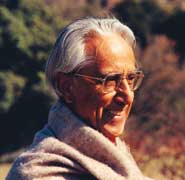




Radical Trinity. All Reality is Trinitarian: God-Man-World
“The experience of the radical Trinity is to know oneself enveloped in a cosmotheandric perichoresis” (The Fullness of Man).
“There is nothing but God, a God that, as absolute ‘I’, has an eternal ‘Thou’ that is equal to him and nonetheless not a second ‘I’ but always a ‘Thou’. This ‘Thou’ is the Son, is the total Christ who includes the heavens and the earth. All beings share what they are by being one with him, with the Son. All that exists, that is to say, all of reality, is nothing but God: Father, Son and Holy Spirit. All that exists is nothing but Brahman as sat, cit, and ânanda, as being consciousness, and beatitude. Sat as the very foundation of all that in one form or another constitutes ‘being’. Cit as the spiritual or intellectual bond that surrounds and penetrates all of reality. Ananda as perfect fullness that receives into itself and inspires everything that reaches out toward it” (The Unknown Christ of Hinduism).
“The Trinity is not a monopoly of Christianity, nor of the Divinity. All of reality has a Trinitarian structure” (Blessed Simplicity).
“The Trinity is the culmination of a truth that penetrates all the domains of Being and consciousness … The Trinity is one of the most profound and most universal visions that Man can have of himself and of God, of Creation and of the Created” (The Trinity).
The concept of the radical Trinity is the cornerstone of the theology of Raimon Panikkar: a Trinity that is not only the Father-Son-Spirit of the Christian tradition, but also God-Man-World; all of Reality as Being-Consciousness-Beatitude (sat, cit, ananda in Hindu thought) which he expresses with his cosmotheandric intuition. The radical Trinity is all Reality in which the Divine, the Human, and the Cosmic are united. This Trinity represents the overcoming of both the temptation of monism (all is one, without distinction), and the temptation of dualism (God and the world are separated by the radical transcendence of God); Panikkar, therefore, resists monism, dualism, and pantheism.
The adjective in radical Trinity is indispensable, because for RP “the Trinity is not the prerogative of a God (Substance, Supreme Being), but rather the defining characteristic of the Real” (“Dios en las religiones”, Misión Abierta, Madrid, 5-6, 1985). It is all Reality that has a trinitarian structure in which everything is intimately related. It is not only God the Father-God the Son-God the Holy Spirit that are in constitutive relationship, but also God-Man-Cosmos, Heaven-Earth-Man (A Self-Critical Dialogue”). The radical Trinity would be a “complement” to the Christian trinitarian insight which RP has no desire to abandon. Father-Son-Spirit would correspond to what Christian theology calls immanent Trinity, divine interiority; God-Man-Cosmos would correspond to what that theology calls economic Trinity, the relationship of God with the world and with man (The Fullness of Man).
Radical Trinity means, therefore, that all Reality is trinitarian relationship. The trinitarian conception is not left to a divine reality situated outside the world in an insurmountable dualism, but rather embraces all existing reality, which comes to be a cosmotheandric reality.
“God, Man, and World are not one, nor two, nor three. There are not three things nor is there only one. There is a radical relativity, an unbreakable interconnection between the Source of what is, what Is, and its own Dynamism; Father, Son, and Holy Spirit; the Divine, the Human, and the Cosmic; Freedom, Consciousness, and Matter … Reality is trinitarian, not dualistic. We can approach it consciously only by denying duality (advaita) without falling into unity. (The experience of God).
It is not a matter of pantheism, since the distance between the I and Thou, the Father and the Son, and between these and the Holy Spirit is infinite … just as is the distance that exists between man and the cosmos. “Nothing is finite in the Trinity, in Reality” … Thus, for Christians this Trinity manifests itself in Jesus Christ: “The radical Trinity, as it manifests itself in Christ, presents us with the adualistic unity between the divine and the human” (La plentitud del hombre).
For R. Panikkar, the tripartite intuition of the Trinity is a “human invariant”, as the expression of a triadic vision of all reality: the divine, the human and the cosmic harmoniously interrelated as they are in the body-soul-spirit human being, and in the space-time-matter world.
The radical Trinity is the fruit of a theanthropocosmic or cosmotheandric experience. There are not three realities (God, Man, and World), but neither is there only one (be it God, or Man, or World), reality is cosmotheandric: “The integration of the trinitarian adventure of all Reality diminishes neither divine transcendence nor the difference between God and World, just as analogously, the trinitarian unity does not eliminate the difference among the divine persons” (The Trinity).
official site